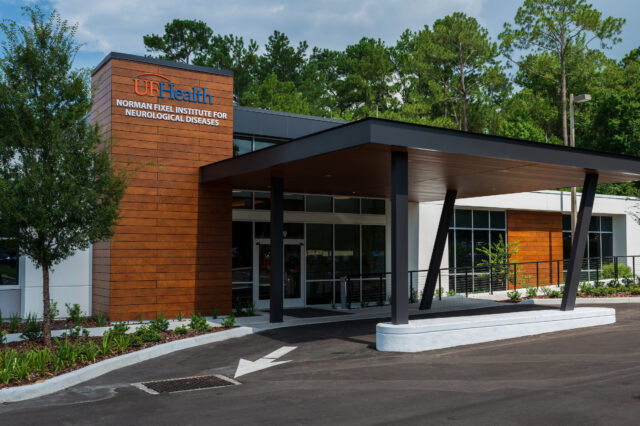Living with multiple sclerosis or another neuroimmunological disorder can feel like a neverending journey. One day you might feel perfectly fine, and the next a relapse may come. The physicians at UF Health in Gainesville, Florida are here to help you break the cycle. Our goal is to stop the progression of these disorders, control your symptoms and help have the quality of life you deserve. Call or click to use the form and schedule an appointment today.
Why choose UF Health for multiple sclerosis care?
The UF Multiple Sclerosis Division was established on the philosophy that integrated, interdisciplinary care is the most effective approach for patients with MS. Our one-of-a-kind clinical research organization was formed in order to address a void in patient care, research, outreach and education regarding multiple sclerosis in Florida.
According to the National MS Society, the state of Florida is home to more than 20,000 MS patients. Our patients have access to highly coordinated, competent and accessible care through our division. While our patients enjoy outstanding clinical care, they also have an open door to the latest clinical/translational research studies. Patients also have a chance to volunteer and assist in future investigator-initiated research studies.
Our goal is for our patients to live a next-to-normal life with little function loss. Most people with MS are very active and have long, fulfilling lives.
What is multiple sclerosis?
Multiple sclerosis is a chronic autoimmune disease that affects the central nervous system. In MS, the immune system attacks and damages the protective covering (called myelin) surrounding nerve fibers in the central nervous system. This damage can disrupt communication between the brain and other parts of the body, leading to a range of symptoms that can vary in severity and duration.
Some common symptoms of MS include:
- Fatigue
- Numbness or tingling in the limbs
- Weakness in the limbs
- Vision problems
- Balance and coordination issues
- Difficulty with bowel and bladder function
What causes multiple sclerosis?
The exact cause of MS is unknown, but it is believed to be a combination of genetic and environmental factors. It is more common in people of Northern European descent and is more prevalent in women than men. MS commonly affects people aged 20-40.
How is multiple sclerosis diagnosed?
Diagnosing MS can be challenging because the symptoms can vary widely from person to person and can be similar to those of other conditions. To diagnose MS, a healthcare provider will typically perform a physical exam, review the patient's medical history, and order various tests, such as:
- Magnetic resonance imaging (MRI) to view the brain and spinal cord
- Evoked potential test to measure the brain's response to stimuli
- Blood tests to rule out other conditions
- Lumbar puncture to test the cerebrospinal fluid for abnormalities
How is multiple sclerosis treated?
There is no one-size-fits-all treatment for MS, as the disease can affect each person differently. At UF Health, our team of experts will work with you to create a personalized treatment plan that is tailored to your specific needs and goals.
What are the treatment options for multiple sclerosis?
- Medications: There are several medications available to help reduce the frequency and severity of MS attacks, slow the progression of the disease, and manage symptoms.
- Rehabilitation: Physical, occupational, and speech therapy can help improve mobility, coordination, and communication skills, as well as assist with daily living activities.
- Lifestyle changes: Making healthy lifestyle choices, such as getting regular exercise, getting enough sleep, eating a balanced diet and managing stress can help manage MS symptoms and improve overall well-being.
What is neuroimmunology?
Neuroimmunology studies how the neurological system and immune system interact. Neuroimmunologists help those who are suffering from a neurological disorder that is caused by inflammation or an autoimmune issue. Some neuroimmune disorders similar to MS include:
- Acute disseminated encephalomyelitis (ADEM)
- Autoimmune encephalitis
- Balo concentric sclerosis
- Brainstem encephalitis
- CAA-related inflammation
- Cerebellitis
- Hashimoto's encephalopathy (steroid-responsive encephalopathy associated with autoimmune thyroiditis)
- Limbic encephalitis
- MOG antibody disease
- Neurologic Beceht's Disease
- Neuromyelitis optica (NMO)
- Neurosarcoidosis
- Optic neuritis
- Paraneoplastic neurological disorder
- Progressive multifocal leukoencephalopathy (PML)
- Stiff person syndrome
- Susac's Syndrome
- Transverse myelitis
- Vasculitis
Telehealth options for multiple sclerosis and neuroimmunology
Our neurological specialists will consult with you in the comfort of your own home using your myuflhealth account. Secure video conferencing protects your privacy and saves you time and money traveling to our office. Telehealth appointments are reimbursable through Florida's Medicaid and Medicare programs. Please contact us to set a telehealth appointment at (352) 294-5400.
Contact multiple sclerosis and neuroimmunology
If you are experiencing a medical emergency or life-threatening circumstances, please call 911. If you wish to speak to a mental health clinician immediately, please dial (352) 265-5481.
If you want to request an appointment with multiple sclerosis and neuroimmunology online, please fill out the form below.




